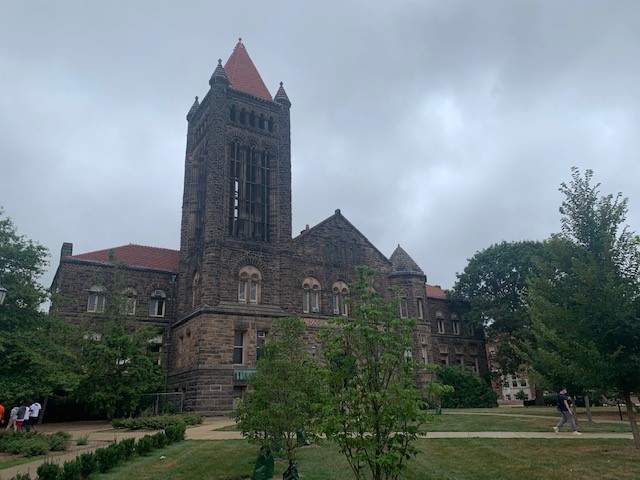A team at the University of Illinois is investigating how misinformation about COVID-19 spreads in rural areas of the state.
U of I journalism professor Nikki Usher leads the team. They spoke with Illinois Newsroom about her findings so far, as part of our “Who’s In Charge of The News?” week special coverage. Usher says some outlets are taking advantage of an information vacuum.
This interview has been edited and condensed for length and clarity.
Nikki Usher: It’s not that Breitbart is zooming in to downstate Illinois, and causing people to reject vaccines. That’s just not what’s happening.
It’s these interpersonal networks of really strong trust in a place where people know each other — and that is then enacted online — that’s helping to create the conditions for how people find out about what’s going on. Sometimes, what they find out and discuss isn’t exactly the most scientifically sound, or can be vaccine resistant, for example. We’re talking about COVID, specifically, which is sort of where we intervene.
So I want to just explain the context of this vacuum. And then I want to look at sort of the ways in which institutional actors take advantage of this or perpetuate this. So I’m still kind of looking for the best data in the state of Illinois that can really speak to some of these misinformation spirals.
Some examples from rural communities that got boosted up nationally — there was one about patients taking ivermectin and filling up local hospitals. That was just kind of an anecdotal, off-the-cuff comment that then got elevated up and reported on in the national news media as if it were true. That’s an example of local-national misinformation. That’s something that I think is really important.
The second thing is understanding the ways in which local politicians are marshaling social media at the local level to raise their careers and their profiles. Often this takes a populist, nationalist, right wing tone. My theory is that social media enables them to draw together supporters that they may not know are out there in the community. While these communities are not entirely politically homogeneous, what we’re seeing is a fracturing within the local Republican Party contours where you have established community politicians being challenged by — still local community elites, but non traditional community elites perhaps — that are entering the political sphere. So sheriffs, or business owners, or local state’s attorneys that are using national controversies that are filled with misinformation, translating them locally, and using that to build a base.
So that’s kind of what I’ve been thinking about. And I think that’s true. I mean, this is all really new stuff. At this point, we’re interviewing people all over the state: politicians, newspaper publishers, public health department officials. We have looked at the public health department pages for all 102 counties in the state of Illinois. We’ve looked at all of the local newspapers in the state of Illinois that are on Facebook. And we’ve scraped their comments. And we’ve done that for local television for all of the markets that are getting viewers.
A step that I wish I would have done — but I know is there — is how the local news outlets themselves allow misinformation to live in these online comments, and ways perhaps incomplete reporting can provide entry points for inserting national talking points into local concerns. That’s kind of the next phase, we have the data, we just need to begin to really analyze it.
Emily Hays: How could you imagine changing local misinformation? Do local news outlets play a role?
Nikki Usher: Local is going to respond to state and national. People’s attention at this point is primarily focused on national news and information. Part of that is demand driven, because the drama of national news is just more interesting sometimes than what’s happening at a mundane level. It’s also arguably more important, because that’s where the nation’s policies are being set and discussed. But also there’s a supply side — that there isn’t that much information for people.
So the question to me really is — is there a way to fill these critical information needs that people have around their daily lives in ways that provide them with reliable news and information? It might be building up local media outlets, or might be just helping empower school districts to help people understand what the current policies are, and what the big debates are.
I think we need to think past legacy media models, and think towards what needs do communities have. What things aren’t they learning about? And what prompts them to go hunting for information that can give them insights?
Because there are just things that people don’t know about their communities. One of the things I found was that there was tremendous interest in case numbers. I didn’t really quite understand why people are so caught up on knowing how many cases of COVID there were. But it gave them a metric for their communities of, “How bad is this?” The data isn’t down to zip code, but people will get all freaked out: “Is there somebody living in my zip code with COVID? I will avoid them. I won’t go to the grocery store.”
Can you tell the difference between social media posts that are credible or misleading? Take our quiz to find out.
Emily Hays is a reporter at Illinois Public Media. Follow her on Twitter: @amihatt.

